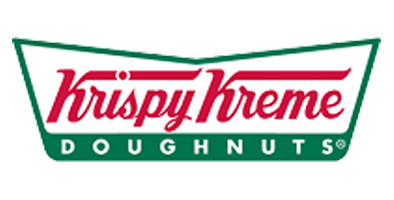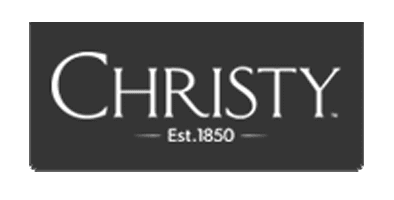Krispy Kreme
Krispy Kreme is an international retailer of premium-quality sweet treats, including its signature hot Original Glazed doughnut. Headquartered in Winston-Salem, NC, the company has offered the highest-quality doughnuts and great-tasting coffee since it was founded in 1937.
Today, Krispy Kreme and its one-of-a-kind Hot Light can be found in over 1000 shops around the world. Currently, Krispy Kreme can be found in 24 countries, including the United States, Australia, Bahrain, Canada, Colombia, Dominican Republic, India, Indonesia, Japan, Kuwait, Malaysia, Mexico, the Philippines, Puerto Rico, the Republic of Korea, Russia, Qatar, the Kingdom of Saudi Arabia, Singapore, Taiwan, Thailand, Turkey, the United Arab Emirates, and the United Kingdom.
The Krispy Kreme brand has several unique elements that have helped them create a special bond with their customers. Their doughnuts, which are made from a secret recipe that has been in the company since 1937, have a one-of-a kind taste that generations of loyal customers have grown to love.
Within the UK, the business has a £60 million turnover, operating 12 manufacturing sites with over 750 retail locations.
PLANNING PROBLEMS BEFORE REFLEX
Before the introduction of Reflex Krispy Kreme predominantly used in-house Excel based spreadsheets for forecasting and production management. There was no system for long-term planning or accurate KPI reporting, just again a dependence on in-house Excel spreadsheets which were very time consuming to maintain and update. This resulted in a huge amount of time and cost being expended on local planning and forecasting. In turn, this yielded very questionable results given the dependence on local retail team ability and free time.
As a business supplying a product with a twelve hour shelf life, the need to provide visibility of production volumes, waste returns and accurate long term forecast was paramount.
REFLEX PLANNING SUITE
The Reflex Demand Planning solution deployed into Krispy Kreme UK ltd has transformed the business in a number of ways. The first has been the amount of time line managers need to spend forecasting their markets and the accuracy achieved. Before Reflex, managers would spend between one and three hours per day looking at limited historical records and manually forecasting every product to be sent. This amounted to at least 20% of a managers’ time which took their focus off the shop floor and delivering sales and service excellence while they performed an administrative function.
With the introduction of Reflex, the amount of time reduced to a maximum of two hours per week to review and monitor forecasts. This in turn allowed managers to focus more on guests by improving brand standards and customer experience. Reviewing locations by forecast exception has made the planning process efficient and productive with only local considerations the remaining time consuming factor. In addition, forecast bias from the natural human need to deal in logical numbers (5%, 10% etc.) has been largely eliminated from the process which in turn reduced excess waste and potential capped sales from impulsive reactions to single data points.
To facilitate this, Krispy Kreme introduced the new role of Demand Planner to the company structure. This additional role serves to manage the Reflex system and the entire demand planning process combining operational practice with statistical analysis. The role also covers central reporting in addition to central forecasting.
The second major advantage gained has been visibility on company-wide KPI’s and ability to report on sales mix. By being able to track the daily sales and waste returns on individual product lines quickly and accurately the business has been able to make decisions at critical points throughout the week to further drive sales and control costs.
The data provided by Reflex has allowed transparency over the brand standards being delivered by each market and provided accurate figures for end of week reconciliation. Detail at this level has revolutionised the Krispy Kreme approach to estate management, something previously unachievable via conventional spreadsheets.
New product development has been influenced considerably by the available data on the performance of historical limited time offers and marketing campaigns. New products and campaigns are informed in part on the basis of hard data from customer behaviour rather than anecdotal feedback and future forecasting has optimised the procurement processes to minimise over ordering or shortages in the supply chain of ingredients.
The third major advantage has been through the analysis of market trends and development of new strategies to control costs. By having the ability to break down and subdivide their markets Krispy Kreme has been able to target key areas for performance improvement and has adopted new strategies to drive sales and control margin. This had led to changes in the way the business recognises waste and the way targets are set and measured.
Since Reflex has been introduced, the range of products available for sale has risen by over 15% while still maintaining control over the returns. By helping to drive additional sales while maintaining those controls, the cost of the waste has reduced by 3% versus previous years.
Request a Demo
"The transparency that Reflex has provided Krispy Kreme in looking at our business and identifying opportunities has been immense. The forecast accuracy achieved through Demand Planning and Sales Analysis has allowed us to pursue a policy of right product in the right place at the right time which has reduced the amount of time our managers devote to the problem and delivered a forecast accurate to around +/-3% per week at the company level. This is something unheard of before we introduced Reflex and continues to deliver dividends to the business from a sales and reporting perspective. The willingness of Reflex as a supplier to customise and write bespoke capabilities to fit our needs is a key part of the way the demand planning solution has been able to fit into our operation and provide the benefits that it has.


